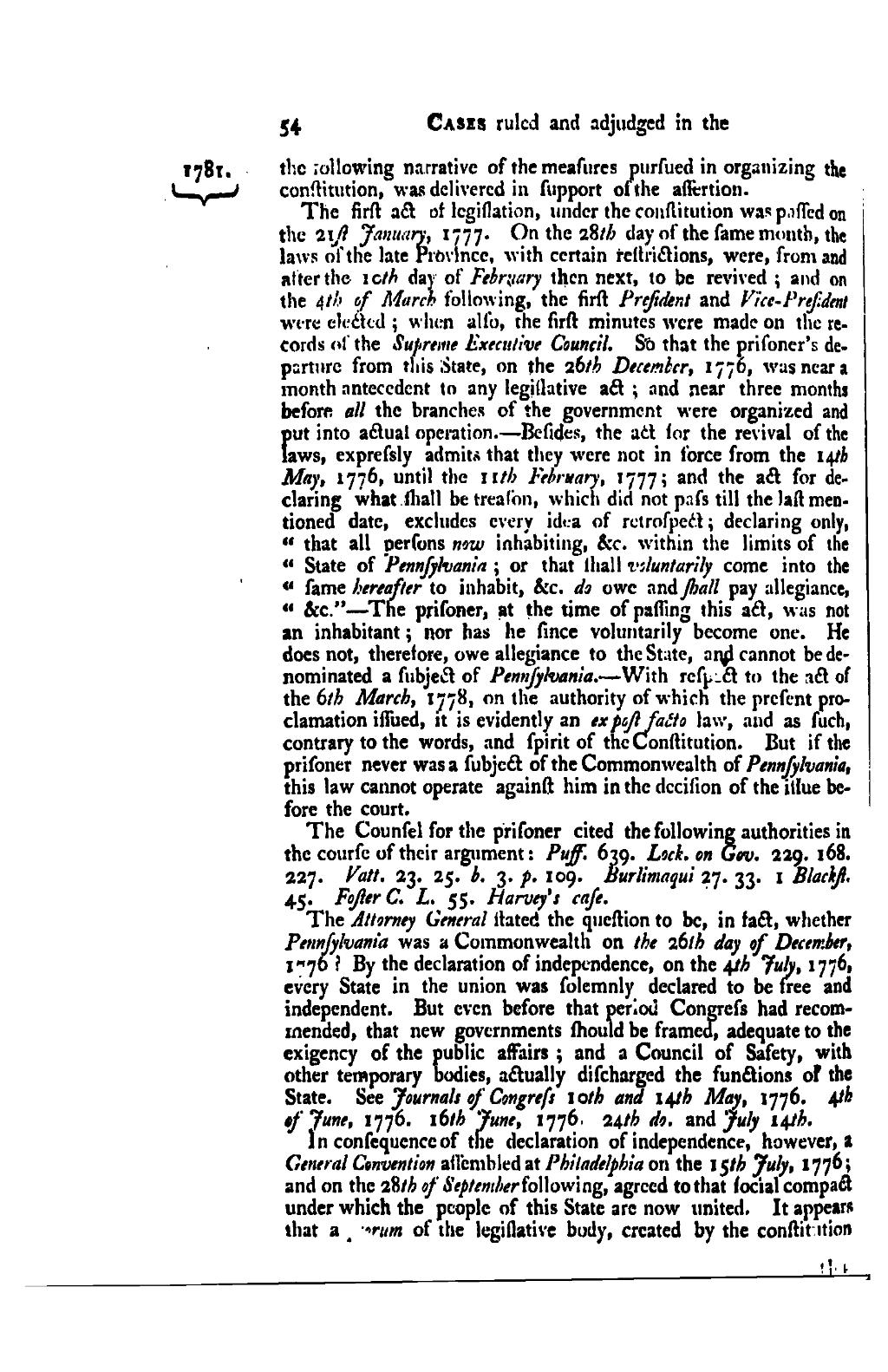1781.
the following narrative of the meaſures purſued in organizing the conſtitution, was delivered in ſupport of the aſſertion.
The firſt act of legiſlation, under the conſtitution was paſſed on the 21ſt January, 1777. On the 28th day of the ſame month, the laws of the late Province, with certain reſtrictions, were, from and after the 10th day of February then next, to be revived; and on the 4th of March following, the firſt Preſident and Vice-Preſident were elected; when alſo, the firſt minutes were made on the records of the Supreme Executive Council. So that the priſoner’s departure from this State, on the 26th December, 1776, was near a month antecedent to any legiſlative act; and near three months before all the branches of the government were organized and put into actual operation.—Beſides, the act for the revival of the laws, expreſsly admits that they were not in force from the 14th May, 1776, until the 11th February, 1777; and the act for declaring what ſhall be treaſon, which did not paſs till the laſt mentioned date, excludes every idea of retroſpect; declaring only,
“that all perſons now inhabiting, &c. within the limits of the State of Pennſylvania; or that ſhall voluntarily come into the ſame hereafter to inhabit, &c. do owe and ſhall pay allegiance, &c.”
–The priſoner, at the time of paſſing this act, was not an inhabitant; nor had he ſince voluntarily become one. He does not, therefore, owe allegiance to the State, and cannot be denominated a ſubject of Pennſylvania.—With reſpect to the act of the 6th March, 1778, on the authority of which the preſent proclamation iſſued, it is evidently an ex poſt facto law, and as ſuch, contrary to the words, and ſpirit of the Conſtitution. But if the priſoner never was a ſubject of the Commonwealth of Pennſylvania, this law cannot operate againſt him in the deciſion of the iſſue before the court.
The Counſel for the priſoner cited the following authorities in the courſe of their argument : Puff. 639. Lock. on Gov. 229. 168. 227. Vatt. 23. 25. b. 3. p. 109. Burlimaqui 27. 33. 1 Blackſt. 45. Foſter C. L. 55. Harvey’s caſe.
The Attorney General ſtated the queſtion to be, in fact, whether Pennſylvania was a Commonwealth on the 26th day of December, 1776? By the declaration of independence, on the 4th July, 1776 every State in the union was ſolemnly declared to be free and independent. But even before that period Congreſs had recommended, that new governments ſhould be framed, adequate to the exigency of the public affairs; and a Council of Safety, with other temporary bodies, actually diſcharged the functions of the State. See Journals of Congreſs 10th and 14th May, 1776. 4th of June, 1776. 16th June, 1776. 24th do. and July 14th.
In conſequence of the declaration of independence, however, a General Convention aſſembled at Philadelphia on the 15th July, 1776; and on the 28th of September following, agreed to that ſocial compact under which the people of this State are now united. It appears that a quorum of the legiſlative body, created by the conſtitution
